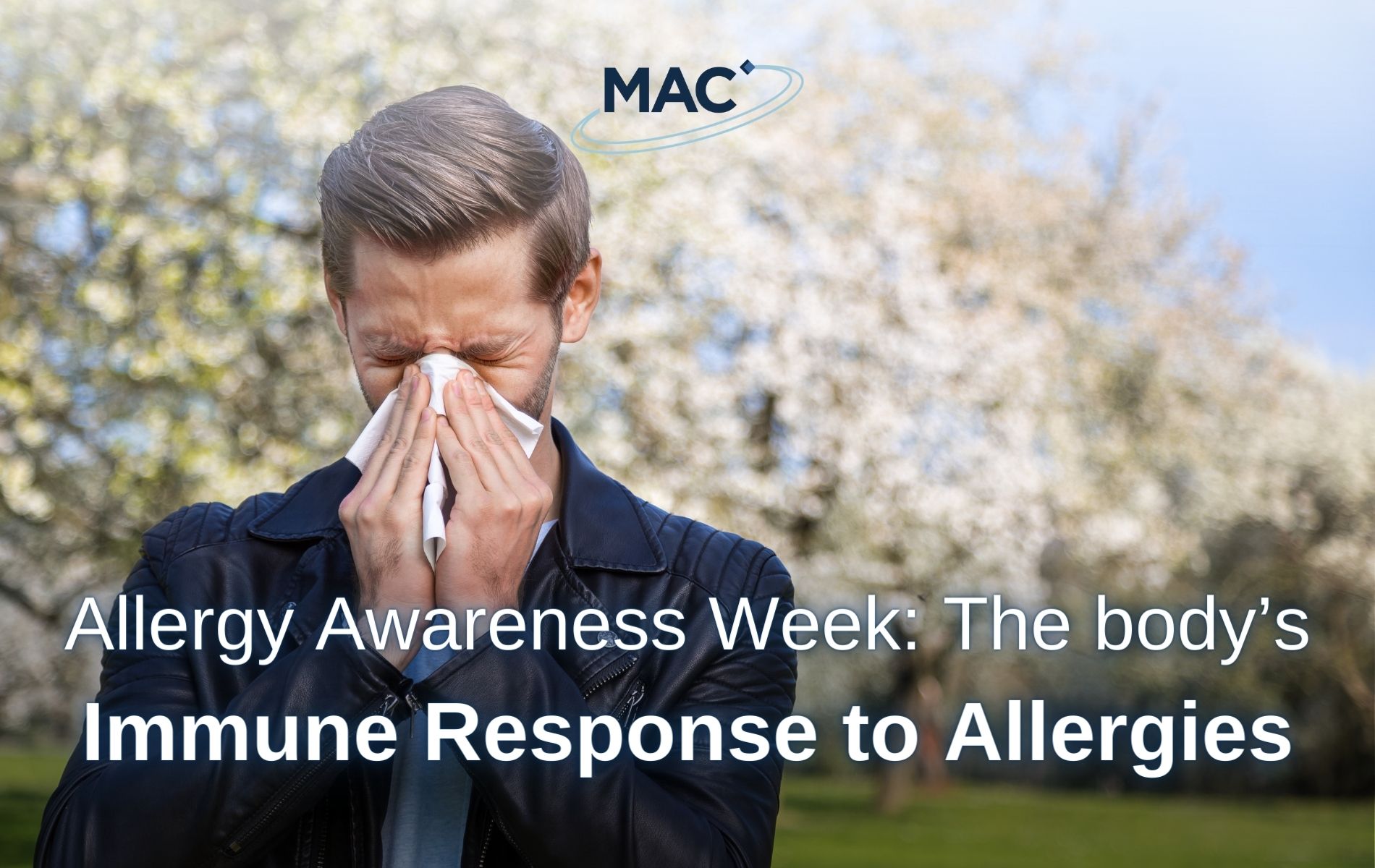Millions of people around the globe live with allergies, symptoms of which can range from mildly irritating to potentially life-threatening. It’s estimated that allergies affect the lives of up to 41 million people in the UK1. As we observe Allergy Awareness Week, we’d like to delve into the fascinating realm of the body’s immune response to allergens.
What Causes Allergic Reactions?
At the heart of allergic reactions lies the immune system, a complex network of cells, tissues, and organs tasked with defending the body against harmful invaders. Under normal circumstances, the immune system can distinguish between harmless substances and potential threats. However, in individuals with allergies, this finely tuned system can misinterpret harmless substances, such as pollen, pet dander, or certain foods, as dangerous invaders.
What Happens During an Allergic Reaction?
The journey of an allergic reaction starts when the body encounters an allergen. This encounter triggers the production of immunoglobulin E (IgE) antibodies, specialised proteins designed to recognise and neutralise specific substances.
In individuals with allergies, the immune system produces IgE antibodies in response to otherwise harmless allergens, marking them as targets for attack.
Once sensitised to a particular allergen, further encounters can lead to the activation of immune cells such as mast cells and basophils, two types of immune cells that contain signalling chemicals, including histamine. During the allergic reaction, these chemicals are released into the surrounding tissues.
Histamine, in particular, plays a central role in the manifestation of allergic symptoms. It triggers physiological responses to expel the allergens out of your body or off your skin, manifesting typically in sneezing, tearing up, or itching.
For instance, in a pollen allergy, histamines will cause more mucus to develop, leading to a runny or stuffy nose and sneezing. The UK Met Office estimates that around 25% of people are affected by tree pollen allergies2, which usually affect people in the early spring, and up to 30% are affected by grass pollen allergies leading to misery in the summer months.
Likewise, for food allergies, if a person consumes some food or drinks that they are allergic to, histamines will work in the gut to trigger a reaction. The UK Food Standard Agency estimates that there are two million people in the UK living with a diagnosed food allergy3.
Furthermore, allergic reactions can vary in severity, ranging from mild localised symptoms, such as hives or itching, to severe systemic reactions, including anaphylaxis. Anaphylaxis is a life-threatening emergency characterised by a sudden and severe allergic reaction that can lead to airway constriction, rapid drop in blood pressure, and loss of consciousness. In 2018, it was reported that over 20 years, 101,891 people in the UK were admitted to hospital for anaphylaxis4. Prompt intervention with epinephrine is critical in managing anaphylaxis and preventing potentially fatal outcomes.
Managing Allergies
Managing allergies often involves a multifaceted approach aimed at minimising exposure to allergens and alleviating symptoms. This may include avoiding known triggers, using medications such as antihistamines or corticosteroids to control symptoms, and in severe cases, undergoing allergen immunotherapy to desensitise the immune system.
Did you know? The first antihistamine was tested in humans through a clinical trial in 19425.
Here at MAC Clinical Research, we are dedicated to improving treatment options through clinical trials for conditions that impact millions worldwide.
If you are interested in taking part in a clinical trial and helping to advance healthcare, you can register for one of MAC’s clinical trials via our current trials webpage.
If you are eligible for one of our clinical trials, you may receive financial reimbursement for your time and commitment. You will also receive travel expenses and a full health check-up from our specialist team.
1 Allergy UK – About Allergy
2 Met Office – Pollen Allergies
3 Food Standards Agency – Food hypersensitivity
4 BMJ – Food anaphylaxis in the United Kingdom: analysis of national data, 1998-2018
5 British Journal of Pharmacology – Histamine pharmacology: from Sir Henry Dale to the 21st century






